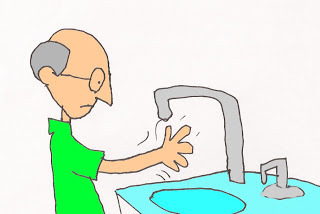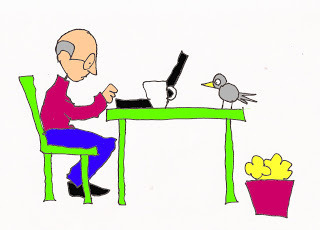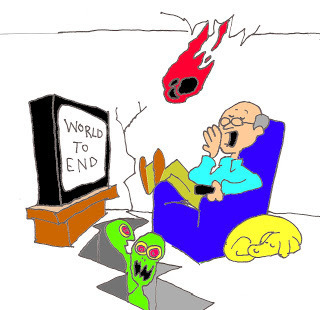Man Martin's Blog, page 169
March 12, 2013
Wedding Bells, Wedding Bills
 The average wedding costs $29,000 which is pretty shocking when you think how few girls ever grew up saying, "I hope one day I'll meet Mr Right, we'll fall madly in love, and have an average wedding." Fortunately, there's plenty of ways to save money on weddings, if you're dollar-conscious.
The average wedding costs $29,000 which is pretty shocking when you think how few girls ever grew up saying, "I hope one day I'll meet Mr Right, we'll fall madly in love, and have an average wedding." Fortunately, there's plenty of ways to save money on weddings, if you're dollar-conscious.The Wedding Dress - A wedding dress can cost as much as $5,000, but if you're willing to economize, you can get a nice polyester blend, slightly irregular, for a couple of hundred. As far as I'm concerned, that's still crazy. Two hundred bucks for a dress you're going to wear, what? Three, four times at most? A terrycloth robe is white, comfortable, and practical. Accessessorize with a belt, and you're ready to go.
 Flowers - Typically flowers run $700 and the bride's bouquet alone can be as much as $150. Are you kidding me? It doesn't make sense paying for something that grows free in nature. Why we've got flowers growing right in our own yard. Nancy says they're dandelions, but I say, "Dandelions, shmandelions." Did you know what becomes of all those flowers after a wedding or a funeral? Would you believe most of them end up in the dumpster.? I'd believe it although I'm not certain because I never checked. So for your next wedding, instead of shelling out 700 clams basically dead plants, check out the dumpster behind the funeral home.
Flowers - Typically flowers run $700 and the bride's bouquet alone can be as much as $150. Are you kidding me? It doesn't make sense paying for something that grows free in nature. Why we've got flowers growing right in our own yard. Nancy says they're dandelions, but I say, "Dandelions, shmandelions." Did you know what becomes of all those flowers after a wedding or a funeral? Would you believe most of them end up in the dumpster.? I'd believe it although I'm not certain because I never checked. So for your next wedding, instead of shelling out 700 clams basically dead plants, check out the dumpster behind the funeral home.Music - A live band. You don't want to know. Even if you get a two-piece combo, with a spoon-player and an accordion, it's likely to set you back a couple K. DJ's are cheaper not much; we're talking $150 an hour. So what can you do to cut corners? Two words. Hank Williams. One more word. Senior. Cause Hank Williams Jr is a phony. Who doesn't like Hank, right? Throw on some old Hank Williams records and put that money straight back in your pocket.
 Photographer - Now this is the crazy part. Back in the old days, a photographer at least had to run down to the drugstore to get the pictures developed, so it made sense to pay him seventy-five, even as much as eighty dollars. Now though, there's no film; it's all digital, ie, pretty much free, but photographers charge - I hope you're sitting down - fifteen hundred all the way up to ten thousand. For what? Am I right, or am I right? You're probably saying, "Screw, that. I got a cell phone, I'll just take the pictures myself." But think about it. What are photographs for, memories right? So just tell everyone there, pay real close attention. Save yourself hassle and money.
Photographer - Now this is the crazy part. Back in the old days, a photographer at least had to run down to the drugstore to get the pictures developed, so it made sense to pay him seventy-five, even as much as eighty dollars. Now though, there's no film; it's all digital, ie, pretty much free, but photographers charge - I hope you're sitting down - fifteen hundred all the way up to ten thousand. For what? Am I right, or am I right? You're probably saying, "Screw, that. I got a cell phone, I'll just take the pictures myself." But think about it. What are photographs for, memories right? So just tell everyone there, pay real close attention. Save yourself hassle and money.Wedding Cake - Average cost. $543. What's really hilarious is when's the last time you heard someone saying, "Boy, I sure have a hankering for some wedding cake right now." You can get a box of Duncan Hines cake mix for under six dollars, and that's the moist deluxe. But I know you don't want to be fooling around making a cake on your special day, so just swing through the Krispee Kreme and pick up a couple of dozen on the way to church. Have them throw in a few jelly-filled while they're at it. It's a special day, after all.
Published on March 12, 2013 03:12
March 11, 2013
The Menace of Public Restrooms
 I still recall the first time I encountered an automatic toilet in a public restroom. Having completed my business, I studied the workings of the chrome pipes trying to find a button or lever to make the thing flush. There was none. I pushed bolts and attempted to twist them. Nothing. Then, as I was walking away in frustration and hygenic anxiety, whoosh - Niagara. The electric eye, sensing my departure, flushed it for me. I just about jumped out of my skin, I can tell you. I thought I'd stepped into a haunted toilet.
I still recall the first time I encountered an automatic toilet in a public restroom. Having completed my business, I studied the workings of the chrome pipes trying to find a button or lever to make the thing flush. There was none. I pushed bolts and attempted to twist them. Nothing. Then, as I was walking away in frustration and hygenic anxiety, whoosh - Niagara. The electric eye, sensing my departure, flushed it for me. I just about jumped out of my skin, I can tell you. I thought I'd stepped into a haunted toilet.Since then, I've grown used to such devices, and almost find it quaint to come across an old-fashioned model with a lever on the side you flush for yourself. In the meantime, the number of electric gizmos in public restrooms has grown exponentially. Therein is the problem. I'm not against progress, mind you. I think technology is great. I've got a gravity-operated chicken feeder and a gravity-operated chicken-waterer, too. They are marvels of ingenuity. I've go a television set, and it's in color. Technology is great. But the higgledy-piggledy way technology appears in public restrooms is a hot mess.
Some restrooms have automatic soap dispensers, some have automatic sinks, some have automatic paper towel dispensers, but oddly none seem to have all of these. So you're left looking like an idiot trying to find the button to squirt some soap only to learn you need only put your hand underneath an wiggle it, and then you're waving your hands fruitlessly under the faucet to get some water, but it turns out to be as responsive to hand motion as a taxidermied duck. The soap dispenser, however, helpfully continues supplying soap. "Someone's waving his hands nearby," the soap dispenser says, "he must need soap. I'll give an extra squirt." By the time you realize the sink has a manual control, there's a big enough puddle of liquid soap to lather a Shetland Pony.
Then you proceed to the towel dispenser, and it's anybody's guess what you'll find. Some you pull out, some shoot out by themselves, some are blow driers.
It sounds curmudgeonly and ungracious, I know, to grouse about such minor things, things which by the way, have been installed for my convenience, to make my life easier. But I feel silly wagging my hands under the sink, hoping it will perform its little magic trick of giving me water. I don't recall ever, back in the Dark Ages before toilets had electric eyes thinking, "This business of flushing is such a chore! If only our top scientists could devise a way to relieve me of this burden. And then - after I've finished flushing, to have to press the button on a soap dispenser and turn on the water! And then to turn it off again. And when I've done with all that, to have to pull out a paper towel. Work, work, work! It's relentless! And they have the gall to call this a restroom." It seemed to me natural when attending to a very personal matter that I should attend to it personally instead of having a bunch of robot servants waiting for me to make my next move. And - although I try not to think about it - it's an uneasy thought that while I'm sitting in meditation during that most private and solitary of my daily routines, the toilet's unblinking red electric eye is keeping vigil on my backside, waiting, waiting, waiting. Waiting for me to arise.
Big Toilet is watching you.
Published on March 11, 2013 03:02
March 10, 2013
Daylight Losing Time
 It is a beautiful morning indeed. I'm writing this outside; birds are singing in the trees, the sun is shining through the high branches of the oaks in the back yard. Sorche and Loretta are playing Busy-Busy Chicken in the garden, still lying fallow in anticipation of the okra, peppers, and tomatoes we will plant in just a few weeks. A breeze starts up now and again that is perhaps a little chillier than is comfortable, but you know that winter's back is broken, and spring is on its way.
It is a beautiful morning indeed. I'm writing this outside; birds are singing in the trees, the sun is shining through the high branches of the oaks in the back yard. Sorche and Loretta are playing Busy-Busy Chicken in the garden, still lying fallow in anticipation of the okra, peppers, and tomatoes we will plant in just a few weeks. A breeze starts up now and again that is perhaps a little chillier than is comfortable, but you know that winter's back is broken, and spring is on its way.It is one of those rare days between the season when everything is promise.
Damn.
The clocks inside say 9:30, which means it's actually 10:30, because today we start Daylight Savings Time, or else we go off Daylight Savings Time, I forget which. Daylight Savings was explained to me in third grade along with long division and the exploration of the Hudson. At the time it seemed a perfectly rational idea, but now I can't remember exactly what the justification is. I'd have to ask a third grader, I guess.
The problem is I've lost an hour this morning, and an hour of an especially beautiful morning: an hour less of birdsong, an hour less of sunshine and cool breezes.
In the fall, when I set the clock back, Daylight Savings Time seemed like a pretty good deal, but now I realize how I've been rooked. Did I really need that extra hour when I got it? There were certain rainy days in February I now recall, and the realization they were an hour longer than they needed to be seems like a pretty raw deal, especially when I have to pay the hour back on a day like today.
I don't want to do away with Daylight Savings Time; I'm sure any third-grade teacher would tell me it has a valuable purpose, but why do we have to sacrifice an hour in the season when an hour is most precious. Therefore I suggest a new technique, instead of setting our clocks forward an hour, we set them twenty-three hours back. It would still be 10:38 instead of 9:38 as the clocks inside the house claim. All the third-grade teachers will still get to teach their students the fascinating rationale behind Daylight Saving, but instead of Sunday; it would be Saturday. I would have a full extra day like this to look forward to. A boon to mankind. I don't know whether this proposal should be addressed to the president, congress, or NASA, but let us work together to make it happen.
Published on March 10, 2013 08:16
March 8, 2013
Tax Season
So now Nancy has assembled all our paperwork, W2's, 1040's, 3 in 1's, and filled out pages of the questionnaire provided by the accountant about medical expenses and charitable contributions, and things, and then she beholds me with a squinty eye and says, "We need to calculate your writing expenses."
This strikes me as hilarious, because before you worry about expenses, you have to worry about income. Writing for me has always entailed considerably more out-go that in-go. (This is especially humbling when you consider how inexpensive writing is. It's not like I'm a sculptor who needs a fresh block of Italian marble every other week. I just need paper. Hell, with a computer I don't even need that. What are my expenses, corn pads for my sensitive fingers after a day of typing?)
Terry Kay once told me that he estimated there were only fifty people in the US who actually made a living writing fiction. I doubt it's that many. If my own experience is any guide, the occasional coins that trickle into the coffer are more than offset by the expenses. For my last novel, for example, I set up a whirl-wind tour through all the major cities: Alpharetta, Athens, Macon, Milledgeville, Micanopy, Tampa, and then off to Iowa City. It was go-go-go. I probably sold, oh, twenty books or so. Oh, yeah, and I also went to Baltimore and Crozet, Virginia. So make that twenty-three books.
If other writers are like me, calling yourself a "professional writer," is like claiming to be a "professional golfer" because you paid $495 to play at Pebble Beach, plus $35 for the cart, and then found a ten dollar bill at the fourth hole.
Nevertheless, last year, I actually made more money writing than I spent doing it. I'm actually going to pay taxes on my writing income.
Holy cow.
Move over, Terry Kay.
This strikes me as hilarious, because before you worry about expenses, you have to worry about income. Writing for me has always entailed considerably more out-go that in-go. (This is especially humbling when you consider how inexpensive writing is. It's not like I'm a sculptor who needs a fresh block of Italian marble every other week. I just need paper. Hell, with a computer I don't even need that. What are my expenses, corn pads for my sensitive fingers after a day of typing?)
Terry Kay once told me that he estimated there were only fifty people in the US who actually made a living writing fiction. I doubt it's that many. If my own experience is any guide, the occasional coins that trickle into the coffer are more than offset by the expenses. For my last novel, for example, I set up a whirl-wind tour through all the major cities: Alpharetta, Athens, Macon, Milledgeville, Micanopy, Tampa, and then off to Iowa City. It was go-go-go. I probably sold, oh, twenty books or so. Oh, yeah, and I also went to Baltimore and Crozet, Virginia. So make that twenty-three books.
If other writers are like me, calling yourself a "professional writer," is like claiming to be a "professional golfer" because you paid $495 to play at Pebble Beach, plus $35 for the cart, and then found a ten dollar bill at the fourth hole.
Nevertheless, last year, I actually made more money writing than I spent doing it. I'm actually going to pay taxes on my writing income.
Holy cow.
Move over, Terry Kay.
Published on March 08, 2013 06:40
March 7, 2013
Notes on a Workplace Refrigerator
Published on March 07, 2013 03:00
March 6, 2013
Consider the Rat
 Being compared to a rat has always been an insult. "You dirty rats!" James Cagney screams before spraying the street with machine-gun fire. "Rats" is a mild oath, or at least it used to be before the coarsening of our culture. When a person was moderately outraged by the latest arrow Fortune had slung at him, he would mutter "rats" under his breath. That seemed to sum it up. Odd, though, that it was rats. Nobody ever said "pigs" or "snails" or "marmosets" when disappointed, just "rats."
Being compared to a rat has always been an insult. "You dirty rats!" James Cagney screams before spraying the street with machine-gun fire. "Rats" is a mild oath, or at least it used to be before the coarsening of our culture. When a person was moderately outraged by the latest arrow Fortune had slung at him, he would mutter "rats" under his breath. That seemed to sum it up. Odd, though, that it was rats. Nobody ever said "pigs" or "snails" or "marmosets" when disappointed, just "rats."Rats, however, may not deserve the rap they get. For example, rats are highly intelligent. This has been proven by scientific studies in which rats were shocked when they touched a certain color bar. The rats learned pretty quickly not to trust the bar, I can tell you. Compare this to humans. Put a sign that says "wet paint" on something and see how many people will come by and touch it.
Moreover, rats respond favorably to maternal attention. Researchers took baby rats from their mothers to see what would happen. When some mothers got their babies back, the mothers began licking them like crazy. Other mothers were just like, "Oh, you're back are you?" It turns out that the rats who were licked by their mothers were more intelligent, healthier, and better adjusted than rats who weren't. You might not think the experience of being licked by a rat, even a mother rat, was all that soothing, but evidently it is for baby rats. Think about all those times your mother spit on a tissue and wiped something off your face. Same thing.
Like humans, rats are omnivorous, meaning some of them will even eat pickled beets. They are are used for lab experiments precisely because their systems are so similar to humans. If we wish to see if, say, a new medicine is safe to use on humans, we feed 200 times the recommended dosage to a rat and watch what happens. If the rat lives, good. If it dies, we do more tests. If it gets an erection lasting more than four hours, we put that on the label.
The main reason, I believe, we have such negative feelings about rats is we associate them with garbage. Find a big, stinking, fetid pile of garbage and there's sure to be rats around. Of course, we might ask ourselves, who created the big, stinking, fetid pile in the first place, but we never do.
Now we come to the inevitable irony at the end of this blog, which you could probably foresee like a freight train barreling down the tracks with its steam whistle blowing and sparks and soot flying from its smokestack. It has always been considered an insult comparing rats to humans, humans who shoot people with machine guns, feed rats massive doses of laxatives and sleeping aids, subject them to electric shocks, take babies from their mothers to see what happens, and pile up stinking heaps of fetid garbage. And it is an insult, too. To the rat.
Published on March 06, 2013 02:43
March 5, 2013
Why I'm Not Worried About the Sequester
 If you want to know what question I'm asked most frequently, it's "What question are you asked most frequently?" And the answer is, "Can I ask you a question?" We're they're not asking about that, they're usually asking about the sequester and the whole doesn't-this-portent-the-end-of-our-once-great nation? kind of thing.
If you want to know what question I'm asked most frequently, it's "What question are you asked most frequently?" And the answer is, "Can I ask you a question?" We're they're not asking about that, they're usually asking about the sequester and the whole doesn't-this-portent-the-end-of-our-once-great nation? kind of thing.And I answer this question with one of my own, "What are you talking about?"
Somehow in the midst of reading all the important news on the internet - how Kate Upton really felt about wearing a bikini to the Antarctic, and how there's a dog in Oregon who feels really guilty about eating the cat treats - I overlooked the item about the sequester, about how the whole US government shut down leaving the Chinese free to take over the country, if they want it.
Basically, though, if you've lived through the end of the world as often as I have, you learn not to be too concerned. The so-called Mayan Apocalypse was just the most recent one. Before that, there was Y2K, which turned out to be an utter nonevent. Even then, I was so jaded about ends of the world and so forth, I barely paid it any mind. Before that, there was some sort of Japanese cult who predicted the world was ending on a certain date, and God was sending flying saucers to pick up the faithful; the only trick was the faithful all had to be dead first, so everyone in the cult met on a hillside and drank cyanide. And then, wouldn't you know it, the flying saucers never showed up. I bet they feel like a bunch of chumps. Oh wait, they're dead. In between those events were threatened asteroid strikes, Legionnaire epidemics, and sequesters.
Does anybody remember those bumper stickers that said, "In case of Rapture, this car will be unoccupied"? When's the last time you saw one of those? Right. That pretty much proves the Rapture has already occurred. All the Righteous people have already left the planet, and we're what's left. You didn't even notice they were missing, did you? And why should you - all the important stuff - government, business, entertainment - is firmly in the hands of the reprobates, so we can rock right along without the Righteous people and not even notice they're gone, which is why I don't worry about the end of the world.
It's already happened.
Published on March 05, 2013 02:58
March 4, 2013
What is Becoming of Our Nation's Bosoms?
 My daily perusal of the internet has convinced me that some portentous and potentially calamitous transformation is taking place among our nation's bosoms. I first noticed this in advertisements appearing in the sidebar of my email, telling me of secrets to increase my testosterone. These notices are always accompanied by photos of women with freakishly large bosoms. Enough said! Too much testosterone, and you'll have freakishly large bosoms, too! I'll steer clear.
My daily perusal of the internet has convinced me that some portentous and potentially calamitous transformation is taking place among our nation's bosoms. I first noticed this in advertisements appearing in the sidebar of my email, telling me of secrets to increase my testosterone. These notices are always accompanied by photos of women with freakishly large bosoms. Enough said! Too much testosterone, and you'll have freakishly large bosoms, too! I'll steer clear.But then, I noticed this eerie condition was spreading. Other informative messages tell me that I can make a fortune investing in "Penny Stocks," which sounds like something you'd want to do except the illustration is always - you guessed it - a woman, again with insanely out-sized mammary glands. Should I risk making a fortune in Penny Stocks if it's going to tempt me into some bizarre breast augmentation therapy?
Perhaps if this chilling syndrome had confined itself to testosterone treatments and day-trading, I could rest easy, but it has not. A message informing me that Obama has eased restrictions on refinancing my home is again accompanied by a woman who looks as if she'd stuffed two bowling balls into her blouse, ditto for an announcement of marvelous savings on car insurance. Are these financial benefits offered out of sympathy for the terrible back pain the unfortunate women must suffer on a daily basis? And now, I see language-learning programs are also accompanied by illustrations of women - studious-looking women, they wear heavy-framed eyeglasses - who also have gargantuan bosoms. What accounts for this terrible and no doubt painful inflammation? Can it be reversed? Is it contagious?
Seth MacFarlane received a lot of flak for his performance during the Oscars, particularly for a song and dance number, "We Saw Your Boobs." I did not see the Oscars myself, because they come on after my bedtime, but perhaps - and I offer this speculation only out of a wish to charitably interpret Mr. MacFarlane's motivations - perhaps he was not being boorish and vulgar after all. Perhaps it was a heartfelt and urgent warning, wrapped in a cheery song and dance number to achieve a greater impact. "We've seen your boobs! We've seen your boobs! For God's sake, seek medical help at once, we've seen your boobs!"
Again, I do not know Mr MacFarlane's motivation for the song, but it would not be amiss in any case, if we took it not as a jejune attempt at humor but as a sincere call to arms against a condition which may threaten every woman on the planet.
Dear Lord, I just saw a message about checking my credit score. The woman in the picture looked like the letter "P." The crisis is upon us. We must act.
Published on March 04, 2013 03:01
March 3, 2013
Girl Scout Cookies Turn Me Into the Cookie Monster

I'm not saying that I suddenly grow blue fur, or that I throw fistfuls of cookies at my mouth, spraying the countryside with crumbs as I masticate, nor do I use such quaint expressions as, "Me want cookie!" No, a more debonair and urbane Cookie Monster, I, a Cookie Monster of some restraint and breeding. Were I to transform into a Werewolf, I would still shave and eat with a knife and fork; I would probably just chase squirrels more often.
Nancy, on discovering all the Girl Scout Cookies are gone, will regard me with a squinty eye and say, "I only ate three cookies, and we had four boxes." This seems an exaggerated claim, but I have no basis for challenging it because I have no idea how many cookies I've eaten. When I open up a box of Samoans - I understand they prefer to be called, "Indigenous Islanders" - a gray mist rises before my eyes and I fall into a sort of trance. When I come to, I'm sitting on the couch, clutching an empty box, a halo of cookie crumbs scattered around me, my breath reeking of coconut and milk chocolate. A terrible emotion, not remorse, but a species of loneliness and desolation travels over my frame. Nancy gives me an expression like Macduff saying, "All my pretty ones - o, hell kite, did you say all? - All my pretty cookies in one fell swoop?"

You need to understand, other cookies do not have this effect on me. Even as I write this, we have a container of Oreos in the pantry. I've eaten more than my share, I'm sure, but I've spared them in the main. Unless Nancy has polished them off, they are there yet. I can say to myself, "Do I want an Oreo? I can have one if I please; I can eat the entire bunch." But my hand trembles not, it is steady as ever; my gaze is steadfast and sure, and while I may get an Oreo cookie later (or three Oreo cookies; I never eat cookies one at a time.) for the moment I am content.
 Part of the problem may be the diabolical way Girl Scouts package their products. Thin Mints come in two long plastic sleeves. Take four cookies out - only a man of iron would take only one - and the sleeve seems forlorn and sadly deflated at one end. Like a sock before you push your toes all the way down. Take four more cookies, and what a parsimonious number you have left. Really, you can see that finishing off the rest of the sleeve would be doing it a favor. No one wants to open a box of cookies and find such a decimated remnant. But then, there's another sleeve of cookies rattling around in a box, a box clearly designed for two sleeves. The remaining sleeve seems lonely all by itself, doesn't it?
Part of the problem may be the diabolical way Girl Scouts package their products. Thin Mints come in two long plastic sleeves. Take four cookies out - only a man of iron would take only one - and the sleeve seems forlorn and sadly deflated at one end. Like a sock before you push your toes all the way down. Take four more cookies, and what a parsimonious number you have left. Really, you can see that finishing off the rest of the sleeve would be doing it a favor. No one wants to open a box of cookies and find such a decimated remnant. But then, there's another sleeve of cookies rattling around in a box, a box clearly designed for two sleeves. The remaining sleeve seems lonely all by itself, doesn't it?Next thing I know, I'm stretched out on the couch in a Thin-Mint daze and Nancy's quoting Macduff at me. But I can't help it. Girl Scout Cookies turn me into the Cookie Monster.
Published on March 03, 2013 04:13
March 2, 2013
How Do They Keep Coming Up with These Great TV Shows?
 "How do they keep coming up with these great TV shows?"
"How do they keep coming up with these great TV shows?"I'm glad you asked, my little darlings, now take out those earphones, and I'll tell you. TV shows begin in far away places where they don't even have shows let alone TV shows - places like Zoomba Land and Miskatonica and Minnesota. There, the little children rush off to the hillsides every morning with their brightly colored baskets to the giant rubber trees to gather the rubber fruit and the majestic cork trees where they gather the cork branches and the dainty little plastic bushes where they pick plastic berries and the thorny little styrofoam vines to pick freshly ripened curlicues of excelsior.
But all of this still doesn't make a TV show, it's entertaining yes, but it's not TV. So all of this produce is tied up in big bundles and taken to the shipping docks where mighty stevedores load and unload it, singing "Day-O" and warning each other to watch for the deadly black tarantulas. "Watch out for that deadly black tarantula, Joe," one of them will say, and the other will respond, "Thanks, Bob, I hadn't noticed."
When it gets to America, it's rolled out into big sheets by a large noisy machine, and then taken to the stamping room. There, ladies inspect each bundle sorting them by size and then sending them off lickety-split to the TV studios out in Hollywood. These bundles are called "scripts." Some bundles become dramas, some are comedies, and some are documentaries about killer sharks, but they're all made from the same raw material, isn't that amazing?
"But aren't there also people on TV? Can I grow up to be a TV person, too?"
The answer is no, and stop asking so many questions. Anybody in this country can grow up to be president or pope, but to be on TV, you have to be chosen from birth. TV people are raised in special rooms where they are kept from interacting with any live actual human being. Sometimes they're allowed out of their rooms early if a TV show needs someone to play the part of a child, but then they're rushed back into the room as soon as possible. Special scientists visit every day in Haz-Mat suits to train them to make expressions - smug for if they've just made a joke, and sort of a crinkle-faced look if they're being serious. If it's a "reality" show, sometimes they put the women in a room together and get them to fight, which they do by smearing peanut butter on their noses.
As you can see, a lot of effort goes into a TV show, and it's nothing for TV people to be at work with bags of ice on the forehead and cups of black coffee until one or two in the afternoon. That's because they believe nothing's is too good for the American public, and that's just what they deliver.
Published on March 02, 2013 04:04




